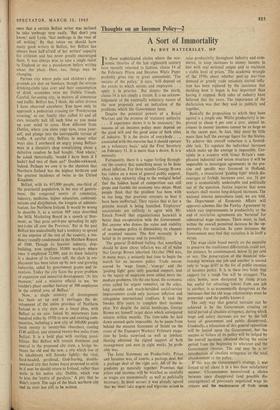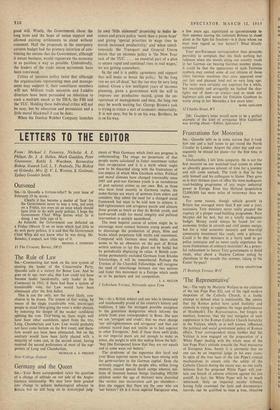Thoughts on an Incomes Policy-2
A Sort of Immortality
By ROY HATTERSLEY, MP
IN those sophisticated circles where the eco- nomic theories of the late eighteenth century have recently returned to fashion, clause 14 of
the February Prices and Incomes White Paper probably gives rise to great amusement. `The success of the policy,' it says, 'will depend on the extent to which unions and employers . . . apply it in practice.' But despite the mirth, clause 14 is not simply a truism. It is an acknow- ledgement of the essentially voluntary nature of the new proposals and an indication of the problems which the Government faces.
Despite the potential powers of a Royal Warrant and the promise of `statutory authority . . . if experience shows it to be necessary,' the success of an incomes policy must depend on the good will and the good sense of both sides of industry. 'It is the desire of everybody . . . associated with this exercise that it should operate on a voluntary basis,' said the First Secretary on February 11. It is more than a desire. It is a necessity.
Fortunately, there is a vague feeling through- out the country that something needs to be done about inflation. For three months George Brown has ridden on a wave of general public support.
Only a tiny minority cling to the vestigial belief that the hidden hand of competition can still grope and fumble the economy into shape. Most people think that the problem has been with us too long, that previous attempts to beat it have been ineffectual. They rejoice that at last a genuine assault is being launched. Employers' associations are unlikely to agree with Mr.
Enoch Powell that organisational hara-kiri is better than co-operation with the Government. But anyone who denies the value and viability of an incomes policy is diminishing its chances of eventual success. The first necessity is a belief in its purpose and its possibility.
The general ill-defined feeling that something should be done about inflation was all of value that George Brown inherited. October 1964 was, in many ways, a uniquely bad time to begin the search for an incomes policy. Trade unions soured by 'wage freeze,' stop-go' and the `guiding light' gave only guarded support, and to the legacy of suspicion were added more im- mediate problems. On the one hand, the economic crisis called for urgent remedies; on the other, long overdue and much-heralded social-service improvements could only increase inflation and antagonise international creditors. It took the Swedes fifty- years to complete their incomes plan. Yet despite the initial handicaps, George Brown set himself target dates which' anticipated success within months. The time-table he laid down seemed quite impossible. As he peeps from behind the massive Statement of Intent on the cover of the Transport Workers' February maga- zine he looks surprised as well as jubilant. Having obtained the signed support of both management and men in eight weeks, he prob- ably was.
The Joint Statement on Productivity. Prices and Incomes was, of course, a package deal, but a package deal of the right sort. All of the in- gredients go naturally together. Promises that prices and incomes will be watched as carefully as wages are economically as well as politically necessary. In most sectors it was already agreed that we `must take urgent and vigorous action to raise productivity throughout industry and com- merce, to keep increases in money income in line with real national output and to maintain a stable level of prices.' The academic wrangle of the 1950s about whether pent'-up war-time demand or greedy trade unionists started infla- tion has been replaced by the insistence that deciding how it began is less important than having it stopped. Both sides of industry have believed that for years. The importance of the declaration was that they said so publicly and together.
Basically the proposition to which they have agreed is a simple one. Whilst productivity is im- proved at about 4 per cent a year, annual in- creases in money incomes cannot be as large as in the recent past. In fact, they must be little more than half the average figure for the Sixties. To achieve this overall reduction is a formid- able task. To regulate the individual increaseS which make up the average is impossible. Cer- tainly in a country with Great Britain's com- plicated industrial and union structure it will be impossible to investigate agreements in the pre- cise and specific way favoured in Holland.
Equally, a resuscitated `guiding light' which dis- courages or forbids increases over, say, 31 per cent is economically undesirable and politically out of the question. Justice 'requires that some workers shall receive long-delayed increases. The national interest necessitates (and, we are told, the Department of Economic Affairs will approve) schemes like the Fawley Agreement by which vast improvements in productivity or the end of restrictive agreements are 'bartered' for substantial wage increases. There must, in fact,
within- the overall permitted increase be the op- portunity for variation. In some instances the Government may feel that variation is in itself a virtue.
The wage claim based merely on the necessity to preserve the traditional differentials could not, for instance, be countenanced, below 31 per cent or not. The preservation of the financial rela- tionship between one job and another is second only to 'wage drift' in the list of public enemies of incomes policy. It is in these two fields that support for a tough line will be strongest. The extra bonus, soon dissipated by rising prices but ukeful for attracting labour from one job to another, is as economically dangerous as the insistence that the old wage relationships must be preserved—and the public knows it The only way that general restraint can be achieved is by the Government creating an initial period of absolute stringency, during which wage and salary increases are me: by the full force of government and public disapproval.
Gradually, a relaxation of this general opposition will be forced upon the Government, but the success or failure of its policy will be judged by the overall increases obtained during the entire period from the beginning to whatever end the Government chooses. The end may be a re- introduction of absolute stringency or the total abandonment of the policy.
If this was the Government's strategy, it was forced to set about it in a less than satisfactory manner. Circumstances necessitated a choice between open disapproval (and possible dis- couragement) of previously negotiated wage in- creases and the maintenance of trade union good will. Wisely, the Government chose the long term and the hope of union support and allowed existing settlements to stand without comment. Half the proposals in the emergency autumn budget had the primary intention of con- vincing the unions that the Government, although it meant business, would regenerate the economy in as painless a way as possible. Undoubtedly, the leaders of the trade union movement have been 'convinced.
Critics of incomes policy insist that although the organisations representing men and manage- ment may support it, their constituent members will not. Militant trade unionists and Luddite directors have been persuaded on television to cock a multiple snook at the DEA, the FBI and the TUC. Holding these individual critics will not be easy, but by education and persuasion and a little moral blackmail it can be dom.
When the Dunlop Rubber Company launches
its own 'little statement' promising to make in- Comes and prices policy 'more than a pious hope' and giving 'special priorities to wage rises to match increased productivity,' and when simul- taneously the Transport and General Union insists that an incomes policy is 'the New Year task of the TUC . . . an essential part of a plan to seCure rapid and continual rises in real wages,' we are getting somewhere.
In the end it is public agreement and support that will make or break the policy. 'In the long run we are all dead,' but the run may be very long indeed. Given a few intelligent years of incomes planning, given a government with the will to improve our productive record, given the co- operation of management and men, the long run may be worth waiting for. George Brown's task is trying to create a sort of economic immortality. It is not easy, but he is on his way. Brothers, he is on his way.



































 Previous page
Previous page